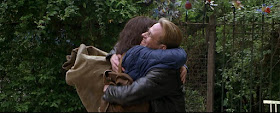Based on a novel by Michael Cunningham (who won the Pulitzer for The Hours), first-time director, Michael Mayer, at first struggles with the time sprawl of the book. The story begins with nine-year-old Bobby, living in Cleveland in the 1960s, and ends in the mid-80s in upstate New York. The initial 60s-storyline, showing Bobby's connection with his beloved older brother Carlton, looks right, but feels like telegraphed exposition. Yet Bobby's adulthood story would be emptier without this prologue. So it's a necessary aspect of an otherwise flowing narrative.
Introduced to adult concepts at a very young age by Carlton, Bobby miraculously absorbs the lessons of the freewheeling 60s while maintaining his sweet nature. As a teen, he's loosely adopted into his friend Jonathan's family, and together they explore their sexual natures, which for Jonathan is gay. With Bobby, sexuality is open to interpretation. He gravitates toward love, wherever that may be. Jonathan's mother, Alice, played by Spacek, immediately recognizes Bobby's capacity for love, and this leads to some confusion. What to do with all that love within a traditional marriage in suburban Cleveland?
After high school, Jonathan (played by wry, low-key Dallas Roberts) moves to the East Village in the early 80s, and Bobby (Colin Farrell) eventually follows. Jonathan is living with an older woman, Clare, played with surprising intensity by Robin Wright Penn. Clare is divorced and a bit lost in the casual dating scene that is New York City. She and Jonathan might have a baby together, even though Jonathan is cruising guys during his free time. In steps Bobby and the dynamics of their impromptu family change.
Bobby and Clare form a couple. Eventually, all three manage to live together as a family, and the entire film is based on that dynamic. How to form a family as an adult and how to deal with the emotional ups and downs of being a trio, are nice twists on the traditional melodrama. And because the chemistry between the principle actors is so strong, watching them together and apart is very moving. The roles among family members alter with time and circumstance. Bobby and Jonathan are friends, brothers, then lovers, then something in between. Clare is a lover and wife. Alice is mother and friend. It flows, like it was supposed to back in the 60s, but never quite did. But it also creates tension and heartbreak, and faith that it will somehow work.
It's all a bit mysterious and open to interpretation, like Bobby himself, who is extremely well-acted by Farrell. I don't think anyone could play this role without a big heart, and it shows in every scene. Child-like and knowing, Bobby is a unique presence in film. Perhaps because I lived in the Castro for several years, I gravitate toward this make-a-family narrative. I know that throughout the film, I wished each of these characters could be in my own life somehow. I haven't felt that way about a film in years.
Bobby and Carlton in Cleveland. Carlton will help shape Bobby into the adult he'll become.
In New York City, Bobby and Jonathan reunite and have no problem showing their affection. Not always rare in life, but rare in film.
Clare meets Bobby. She and Jonathan are a sort of couple.
That's about to change.
Robin Wright Penn is terrific in this film. She brings a nervous energy that I've never seen before in any of her roles. Clare is free to live her life, yet that freedom makes her anxious for something substantial and real. Here, she's worried about Bobby's hair—telling him that the wrong haircut can alter your life by telegraphing the wrong things about you to the world. Artists...
The trio, entwined, but struggling with their arrangement.
Composition designed to portray emotional states of being.
New York City in the 80s. Yup.
Connection, distance, tension.










No comments:
Post a Comment